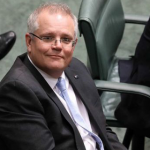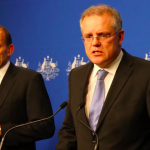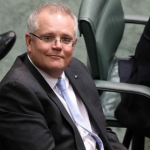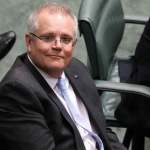Morrison’s Jerusalem Fiasco: Diplomacy in a Wet Paper Bag
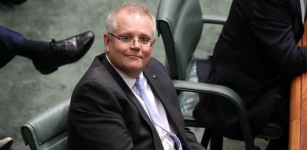
Scott Morrison’s mid-October suggestion that his government might recognise Jerusalem as the capital of Israel and move the Australian embassy from Tel Aviv to the contested city was an attempt to win domestic gain at the expense of the nation’s foreign diplomatic standing.
Indeed, the announcement was perceived as a last-minute grab for the 12 percent Jewish vote in the Wentworth byelection, which was made after most of those constituents had already cast a postal vote to avoid voting on the election day, which took place on the Sabbath.
Morrison’s final position statement on the issue was just as messy. During a speech at the Sydney Institute on 15 December, he announced that Australia now recognises West Jerusalem as the capital of Israel.
The PM went onto say that he was also acknowledging the “aspirations of the Palestinian people for a future state with its capital in East Jerusalem”. He further said that the Australian embassy won’t be moved to West Jerusalem until an Israeli-Palestinian peace settlement is reached.
The move flew in the face of the decades-old majority-nation diplomatic practice of not recognising Jerusalem as the capital of Israel. And the announcement not only outraged the Palestinian people and Australia’s closest Muslim neighbours, but it even drew the ire of Israel itself.
A Band-Aid solution
“The prime minister’s original thought bubble about moving the embassy was clearly done without proper consultation with DFAT, diplomatic networks, or those responsible for security,” said Bishop George Browning, president of the Australia Palestine Advocacy Network.
Indeed, the Coalition’s final Jerusalem position was the result of a scramble by some of the nation’s most senior bureaucrats to seek a direction on the divisive issue that caused as little diplomatic fallout as possible, whilst having the PM not seen to be backing down on his initial posturing.
“What has emerged as his final statement is just silly and being silly is destabilising,” Bishop Browning told Sydney Criminal Lawyers®. “It does not please Israel and its supporters because they already claim the whole of Jerusalem as their capital.”
According to the Bishop, Morrison’s position is an “affront to Palestinians and their supporters because the status of Jerusalem is to be the outcome of final peace negotiations”.
Occupied territory
At the end of the 1948 Arab-Israeli War, Israel occupied West Jerusalem, while Jordan was in control of the east of the city. During the 1967 Six Day War, Israel seized control of East Jerusalem and extended the city’s municipal boundaries.
And in 1980, the Knesset – the Israeli parliament – passed the Jerusalem Law, which recognised the whole of Jerusalem as the capital of Israel. However, Israel’s occupation of East Jerusalem is considered illegal under international law.
Bishop Browning warns that there would be no viable Palestinian state without East Jerusalem. And at present Israel is continuing to “Judaise the whole of Jerusalem”, which makes Australia’s recognition of its capital in the west a “reward for bad behaviour”.
And as the Bishop further points out, Morrison’s recognition comes just months after Israel passed its Nation-State Law, which relegated Palestinians to the rank of second class citizens, downgraded Arabic from being an official language and reaffirmed the whole of Jerusalem as its capital.
International fallout
Chief Palestinian negotiator Saeb Erekat said the move was born out of “petty domestic politics”. He asserted that Jerusalem is a “final-status issue for negotiations” and that under international law, East Jerusalem is an integral part of occupied Palestinian territory.
Israeli minister for regional cooperation Tzachi Hanegbi remarked that Morrison had “made a mistake” in his announcement as he only recognised half the city as the capital of Israel, whereas his government lays claim to the entire city.
While the world’s most populace Muslim nation, Indonesia stated that Australia and all UN member states should recognise Palestine and work towards a two-state solution. But, the status of a $16 billion trade deal between Australia and Indonesia is still unclear.
Indonesian foreign minister Retno Marsudi stated in November that Morrison’s initial Jerusalem announcement was the reason the Indonesian-Australia Comprehensive Economic Partnership Agreement hasn’t been finalised.
Unbridled support
Morrison’s Jerusalem announcements follow the decision of US president Donald Trump to recognise the whole of the city as the capital of Israel in December 2017. And the US embassy was moved to Jerusalem last May.
The embassy move sparked huge Palestinian demonstrations, which led Israeli forces to kill over one hundred protesters. On 14 May, the day of the official embassy opening, 58 unarmed Palestinian demonstrators were killed by Israeli troops along the border of the Gaza Strip.
Following the violence, the United Nations Human Rights Council held an emergency meeting. Twenty nine countries voted in favour of establishing an independent investigation into the Gaza massacre, while two countries voted against it: Australia and the United States.
The notes of the meeting state that Australia “expressed deep sadness and regret about the loss of life and injury” that occurred at the Gaza protest. However, it believed that “Israel had legitimate security concerns”.
It’s time
Three days after Morrison set out the Coalition’s final position on Jerusalem, federal Labor passed a resolution at its national conference that after its likely win in the next election, the new Labor government will recognise Palestine as a state.
The move will put Australia in line with 138 other nations around the world that already recognise the Palestinian nation.
Bishop Browning welcomes this move and sees it as a positive step, which would contribute to bringing about justice for Palestinian people who currently live in parts of the West Bank under Israeli military control, where their rights aren’t upheld and they’re being pushed into tiny enclaves.
“This blatant system of apartheid needs to be resisted by the international community and recognising Palestine is a key component in the free world’s obligation to stand up for human rights under international law,” Bishop Browning continued.
“Australia needs to join most other nations in recognising Palestine and in the process making it clear that Israel’s colonising activity is unacceptable, must end and Palestinian human rights must be restored,” he concluded.


